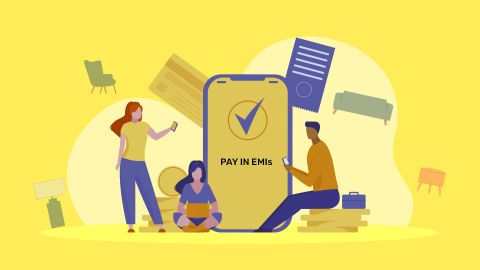Face shields are an essential piece of protective equipment, designed to provide a barrier against harmful particles, fluids, and debris. Widely used across various industries, including healthcare, manufacturing, and education, face shields offer comprehensive protection by covering the entire face. This protective gear is crucial in environments where exposure to airborne particles or splashes is a concern. When choosing face shields, it is important to consider factors such as material quality, comfort, and compatibility with other protective equipment.
Check out a wide range of face shields on Bajaj Mall. Alternatively, visit any of Bajaj Finserv’s 1.5 lakh partner stores in 4,000 cities in India. Choose the product that you like and get Easy EMI and zero down payment offers exclusively with Bajaj Finserv’s financing options.
Introduction to face shields
Face shields are essential protective gear designed to safeguard the wearer’s face from potential hazards, such as splashes, droplets, and other harmful substances. They are widely used across various industries, including healthcare, laboratories, and manufacturing, to provide an additional layer of defence. Face shields cover the entire face, ensuring that the eyes, nose, and mouth are protected from direct exposure. In medical settings, they are often paired with masks to enhance safety, particularly in environments with a high risk of infection. For those working in laboratories, especially in pathology labs, face shields are a crucial part of the overall safety equipment. If you are setting up or managing a lab, it is important to include face shields in your pathology lab equipment list to ensure comprehensive protection for all personnel.
Key features of face shields
- Full face coverage: Designed to protect the entire face, including critical areas such as the eyes, nose, and mouth, face shields offer a comprehensive barrier against droplets and splashes.
- Clear and anti fog visibility: High-quality face shields are made from transparent materials, often treated with an anti-fog coating to maintain clear visibility, even in humid conditions.
- Adjustable fit: Many face shields come with adjustable headbands or straps, ensuring a snug and comfortable fit for users of different head sizes, and enhancing usability over long periods.
- Lightweight construction: Constructed from lightweight materials, face shields are designed to reduce strain during extended use, making them ideal for all-day wear in demanding environments.
- Durable and impact resistant: Face shields are typically made from shatter-resistant plastics like polycarbonate, providing durability and protection against impacts or debris.
- Easy to clean and disinfect: Reusable face shields can be quickly cleaned and sanitised, ensuring they remain effective and hygienic for multiple uses.
Types of face shields
- Disposable face shields: These are intended for single use and are commonly used in high-turnover settings like hospitals. They offer cost-effective protection and are easy to replace after each use.
- Reusable face shields: Built for durability, reusable shields can be cleaned and reused multiple times, making them a more sustainable and economical option in the long term.
- Custom face shields: These shields can be tailored to meet specific requirements, such as custom sizing, additional features like ventilation, or branding for organisations.
- Medical-grade face shields: Specifically designed for healthcare settings, these shields provide high levels of protection and comfort, essential for medical professionals during patient interactions.
- Industrial face shields: Used in environments where flying debris, chemical splashes, or hazardous materials may be present, these shields offer enhanced protection and durability.
- Children’s face shields: Designed with smaller dimensions and often featuring fun designs, these shields make it easier for children to wear protective gear without discomfort.
Also read: Venturi masks
Benefits of using face shields
- Enhanced protection: Face shields provide a reliable barrier against splashes, droplets, and airborne particles, significantly reducing the risk of exposure to contaminants.
- Comfortable wear: Designed with user comfort in mind, face shields can be worn for extended periods without irritation, making them ideal for professionals who require long-term protection.
- Ease of maintenance: Reusable face shields are easy to clean and disinfect, ensuring they remain sanitary and effective for repeated use.
- Integration with other PPE: Face shields are designed to work with other personal protective equipment, such as masks and goggles, providing comprehensive protection.
- Cost-effective safety solution: Face shields offer a budget-friendly option for personal protection, particularly when purchased in bulk for organisational use.
- Clear communication: Unlike masks, face shields allow for full visibility of facial expressions and lip movements, which is crucial in settings where communication is essential, such as in healthcare or customer service.
How to choose the right face shields?
Choosing the right face shield depends on your specific needs and environment. Here are some key factors to consider:
- Material: Opt for durable materials like polycarbonate for impact resistance or acetate for chemical resistance.
- Coverage: Full-face shields offer comprehensive protection, while extended shields provide additional neck and chest coverage.
- Comfort: Look for adjustable headgear, lightweight designs, and anti-fog coatings for prolonged use.
- Purpose: Match the shield to your activity—e.g., tinted shields for bright environments or disposable shields for short-term use.
- Certifications: Ensure the shield meets safety standards for personal eye protection.
Face shield vs face mask: Which is better?
Face shields and face masks serve different purposes, and their effectiveness depends on the situation:
Feature |
Face shield |
Face mask |
Coverage |
Full-face coverage, including eyes, nose, and mouth |
Covers only nose and mouth |
Filtration |
Limited; less effective for small airborne particles |
Better filtration of small particles |
Reusability |
Reusable and easy to clean |
Disposable or reusable, depending on type |
Comfort |
Comfortable for prolonged use |
May cause discomfort over extended wear |
Eye protection |
Provides protection for eyes |
Does not protect eyes |
Best use |
Ideal for additional protection with a mask |
Effective for preventing respiratory droplet spread |
How to maintain your face shield?
Maintaining your face shield properly ensures its effectiveness and longevity. Here are some tips:
- Clean regularly: Use a soft cloth or sponge with mild soap and water to clean the surface. Avoid harsh chemicals that may damage the material.
- Disinfect appropriately: Use an alcohol-based disinfectant or a diluted bleach solution to sanitise after each use, especially if it is exposed to high-risk environments.
- Prevent scratches: Store the face shield in a protective cover or safe place when not in use to avoid scratches or damage to the transparent surface.
- Inspect for damage: Check for cracks, fogging, or wear and replace the shield if it becomes compromised.
- Handle gently: Avoid bending or applying pressure to the shield, as it could warp the material or reduce visibility.
Face shields for industrial usage
Face shields for industrial uses are designed to provide protection against hazards like flying debris, chemical splashes, and heat. Here are some common types and their applications:
- Polycarbonate shields: Durable and impact-resistant, ideal for construction and manufacturing.
- Chemical-resistant shields: Made from acetate or similar materials, suitable for handling chemicals.
- Heat-resistant shields: Often used in welding or foundry work, these shields protect against high temperatures.
- Arc flash shields: Designed for electrical work, offering protection against electrical arcs.
- Full-face shields with hard hats: Provide combined head and face protection, commonly used in heavy industries.
Financing options with Bajaj Finserv
With Bajaj Mall exploring a wide variety of face shields and medical equipment is convenient. Once you have gathered all the necessary details, visit the nearest Bajaj Finserv partner store to pick your preferred product. Complete your purchases with Bajaj Finserv’s financing options, which set a predefined spending limit. Along with that, you can opt for a repayment tenure that works for you, ensuring the cost is covered through affordable EMIs. Bajaj Finserv also offers financing for electronic devices.
Advantages of shopping with Bajaj Finserv
- Easy EMI: With the Bajaj Finserv’s financing options, you can purchase a face shield without worrying about the price tag. You can convert the price into small, interest-free payments by selecting your preferred Easy EMI plan.
- Flexible tenures: Choose repayment tenures ranging from 3 months to 60 months, allowing you to pay for your desired face shield at a pace that suits your budget.
- Zero down payment: With zero down payment options on select models, you can take the selected face shield without a hefty upfront payment.
- Pre-approved limit: Get pre-approved credit up to Rs. 3 lakh, making it easy to select and purchase your preferred face shield.
- Wide network of partner stores: Shop from over 1.5 lakh partner stores and explore myriad options.




